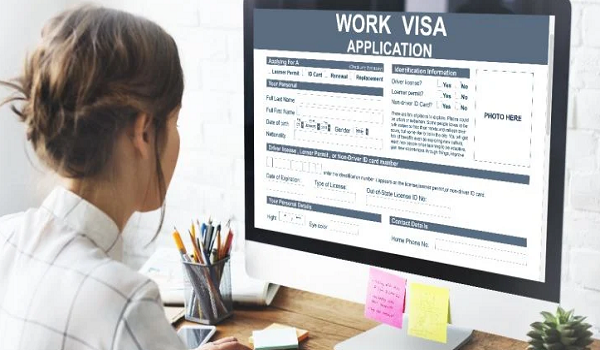The United States of America has long been a land of opportunity, drawing individuals from all corners of the globe with its promise of professional growth and a higher quality of life. If you’re among the countless individuals looking to apply for $90,000+ work in USA this year, you’re embarking on a journey that can be both exciting and challenging. To help you navigate the process successfully, we’ve put together this comprehensive guide that will take you through the essential steps, requirements, and key considerations when applying for work in USA.
The process of applying for work in USA can be complex, as immigration and employment laws are continually evolving. This guide is designed to provide you with a simplified yet detailed overview of the steps you need to take to achieve your goal. From identifying the right visa options to exploring job opportunities, understanding the legal requirements, and preparing a compelling application, we’ll cover it all.
So without further ado, let’s proceed…
Types of $90,000+ Work in USA Available For Foreigners
Foreigners can find a variety of job opportunities in the United States, but the specific options available to them can depend on their immigration status, qualifications, and work permits.
Here are some common job opportunities for foreigners in the USA:
1. Tech Industry:
The United States has a robust technology sector with many job opportunities for skilled workers in fields like software development, data science, and IT.
2. Healthcare:
The healthcare industry is in constant need of medical professionals, including doctors, nurses, and healthcare administrators.
3. Academia:
Foreigners with advanced degrees and teaching or research experience can find positions in American universities and research institutions.
4. Finance:
Jobs in finance, such as investment banking and financial analysis, are available for qualified professionals.
5. Engineering:
Engineering is another field with a high demand for skilled professionals, including mechanical, electrical, and civil engineers.
6. Hospitality and Tourism:
Jobs in hotels, restaurants, and the tourism industry are often available for foreigners on work visas.
7. Construction and Skilled Trades:
There is a constant need for skilled labor in construction, including carpenters, plumbers, and electricians.
8. Consulting:
Management consulting firms often hire foreign talent with expertise in various industries.
9. Sales and Marketing:
Companies across various industries hire sales and marketing professionals to promote their products and services.
10. Green Jobs:
With an increasing focus on sustainability and renewable energy, there are opportunities in the green sector, including solar and wind energy.
11. Entrepreneurship:
Some foreigners may choose to start their own businesses in the USA through various visa options like the E-2 Investor Visa or the O-1 Visa for individuals with extraordinary ability or achievement.
12. Transportation and Logistics:
Opportunities exist in trucking, logistics, and supply chain management.
13. Arts and Entertainment:
Musicians, actors, artists, and performers can find work in the entertainment industry.
14. Manufacturing:
Jobs in manufacturing plants are available, particularly in regions with a strong industrial presence.
15. Nonprofit Organizations:
Many nonprofits hire foreign professionals to work on various social and humanitarian projects.
16. Retail:
Retail stores often employ foreign workers, especially in major cities.
Visas To Apply For To Find Work In USA
Applying for a work visa in the United States can be a complex and challenging process, but it is essential for those who want to live and work in the country legally.
The U.S. offers several types of work visas, each with its own requirements and eligibility criteria. In this extensive guide, we will explore some of the most common work visas individuals can apply for to find work in the USA.
1. H-1B Visa:
The H-1B visa is one of the most popular work visas for professionals in specialty occupations, such as IT, engineering, and healthcare.
To qualify, you must have a job offer from a U.S. employer, and your job must require specialized knowledge or skills.
The employer must also obtain a Labor Condition Application (LCA) from the Department of Labor and comply with certain wage and working condition requirements.
The H-1B visa is initially granted for up to three years and can be extended for a maximum of six years.
2. L-1 Visa:
The L-1 visa is for intracompany transferees, allowing multinational companies to transfer their employees to a U.S. office.
There are two types of L-1 visas: L-1A for managers and executives, and L-1B for employees with specialized knowledge.
To qualify, you must have worked for the foreign company for at least one year in the past three years.
3. E-2 Visa:
The E-2 visa is for individuals from countries that have a treaty of commerce and navigation with the U.S.
It is an investor visa, allowing individuals to start or purchase a business in the U.S.
The investment must be substantial, and you must have control and develop the business.
4. O-1 Visa:
The O-1 visa is for individuals with extraordinary ability or achievement in their field, such as artists, scientists, or athletes.
To qualify, you need to demonstrate a high level of expertise and recognition in your field.
This visa is typically granted for three years and can be extended in one-year increments.
5. TN Visa:
The TN visa is for Canadian and Mexican professionals under the North American Free Trade Agreement (NAFTA).
It’s available for specific professions and requires a job offer from a U.S. employer.
TN visas are typically issued for up to three years and can be renewed.
6. H-2B Visa:
The H-2B visa is for temporary non-agricultural workers in seasonal or peak-load industries.
Employers must demonstrate that there is a temporary need for the position and prove they cannot find qualified U.S. workers.
7. J-1 Visa:
The J-1 visa is for exchange visitors, including students, scholars, and professionals.
Some J-1 programs may offer employment opportunities, but they must be related to the purpose of the exchange program.
8. Green Card (Permanent Residency):
While not a work visa, obtaining a green card allows individuals to live and work in the U.S. permanently.
There are various categories for green card eligibility, including employment-based categories (EB-1, EB-2, EB-3) for individuals with exceptional abilities, advanced degrees, or skilled workers.
9. Optional Practical Training (OPT):
This is not a visa but an extension of an F-1 student visa. It allows international students to work in their field of study for a specified period after graduation.
10. STEM OPT Extension:
STEM (Science, Technology, Engineering, and Mathematics) graduates on F-1 visas can apply for a 24-month extension of their OPT period.
How To Find Work In USA
Finding work in USA can be a challenging but rewarding endeavor. Here are the steps to help you find work in the United States:
1. Determine Your Eligibility:
Before you start looking for work, make sure you are eligible to work in USA. U.S. citizens, permanent residents, and certain visa holders are typically eligible.
2. Work Authorization:
If you are not a U.S. citizen or permanent resident, you may need a work visa. Common work visas include H-1B, L-1, E-2, and O-1 visas. Consult with an immigration attorney or the U.S. Citizenship and Immigration Services (USCIS) for information on the appropriate visa for your situation.
3. Prepare Your Resume/CV:
Tailor your resume or curriculum vitae to the U.S. job market. Highlight your skills, qualifications, and experience. Ensure it follows U.S. formatting and standards.
4. Research the Job Market:
Research the job market in your field. Websites like LinkedIn, Indeed, Glassdoor, and Monster can help you find job postings. Consider using company websites and industry-specific job boards as well.
5. Networking:
Networking is essential in the U.S. job market. Attend job fairs, industry events, and join professional associations. Use LinkedIn to connect with professionals in your field.
6. Apply for Jobs:
Apply to jobs that match your qualifications and skills. Follow the application instructions carefully. Many companies require online applications, so be prepared to submit your resume and cover letter electronically.
7. Prepare for Interviews:
If you receive interview invitations, prepare thoroughly. Research the company, practice common interview questions, and be ready to discuss your qualifications and experience.
8. Consider Internships:
If you’re having difficulty finding a full-time position, consider internships or temporary work. It can be a foot in the door to a permanent job.
9. Use Job Placement Agencies:
Recruitment agencies and headhunters can help match you with job opportunities in your field.
10. Understand U.S. Labor Laws:
Be aware of U.S. labor laws, including minimum wage, employee rights, and employer responsibilities.
11. Work on Soft Skills:
U.S. employers often value soft skills like communication, teamwork, and problem-solving. Highlight these in your application and interviews.
12. Online Presence:
Maintain a professional online presence. LinkedIn is crucial for job hunting in the U.S. Ensure your profile is complete and showcases your skills and experience.
13. Prepare for a Background Check:
Many employers in the U.S. conduct background checks on potential employees, so ensure your history is accurate and honest.
14. Patience and Perseverance:
Job hunting can take time. Be patient and persistent. Rejections are common, but perseverance can lead to success.
15. Legal Documentation:
Ensure that you have all the necessary legal documentation to work in the U.S., including a Social Security Number or an Individual Taxpayer Identification Number (ITIN).
16. Cultural Awareness:
Understanding the culture and workplace norms in the U.S. can be important for your job search. Be prepared to adapt to the local work environment.
17. Seek Career Guidance:
If you’re struggling, consider seeking career guidance or advice from professionals or career counselors.
Requirements to Get Work In USA
To successfully work in the United States, you must adhere to specific requirements, rules, and processes. Securing employment in USA can be a rewarding opportunity, but it necessitates compliance with legal procedures and regulations.
1. Understanding Visa Types for Work in USA:
The first crucial step to Work in USA is obtaining the right visa. USA offers various work-related visas, each with specific eligibility criteria. Common work-related visas include H-1B for skilled workers, L-1 for intracompany transfers, and O-1 for individuals with extraordinary abilities. Make sure to select the appropriate visa category that aligns with your qualifications and intended job.
2. Securing a Job Offer:
To Work in USA, you typically need a job offer from a US employer. This employer will need to petition for your visa. It’s important that the job offer matches the visa category you’re applying for. Employers often assist with the visa application process, ensuring that you meet the specific visa requirements.
3. Labor Certification:
In some cases, employers must obtain labor certification from the Department of Labor (DOL) to prove that there are no qualified US workers available for the position you’re applying for. This is especially true for employment-based green cards (permanent residency).
4. Complete Visa Application:
Once you have a job offer and all required documents, it’s time to complete the visa application. Each visa category may have different forms and requirements, so be sure to follow the instructions provided by the US Citizenship and Immigration Services (USCIS).
5. Visa Interview and Approval:
After submitting your application, you’ll typically need to attend a visa interview at a US embassy or consulate in your home country. Be prepared to discuss your qualifications and your intent to work in USA. If everything goes smoothly, your visa may be approved.
6. Health and Background Checks:
The US government may require you to undergo a medical examination and background check as part of the visa application process. Ensuring you meet the health and character requirements is vital to work in USA.”
7. Financial Requirements:
Some visa categories, like the E-2 investor visa, may require you to make a substantial investment in USA. It’s crucial to have the financial means to meet these requirements.
8. Maintaining Legal Status:
Once you work in USA, it’s essential to maintain your legal status. This involves adhering to the conditions of your visa, renewing it as necessary, and complying with US laws and regulations.
9. Tax Obligations:
Be aware of your tax obligations as a foreign worker. USA has a complex tax system, and it’s important to understand your tax liability.
10. Permanent Residency:
If you plan to stay in USA long-term, consider applying for a green card (permanent residency). The process can be lengthy and involves different categories, such as family-sponsored, employment-based, and diversity visa programs.
11. Seek Legal Assistance:
Navigating the US immigration system can be challenging. Seek legal assistance from an immigration attorney to ensure you meet all work in USA” requirements and have the best chance of success.
Documents Required To Apply For Work In USA
The specific documents required to apply for work in the United States can vary depending on your immigration status, the type of job you’re seeking, and the employer’s requirements.
However, there are some common documents and steps that most individuals need to consider:
1. Valid Passport:
A valid passport from your home country is typically required for identification and travel purposes.
2. Visa:
You may need a work visa to legally work in the United States. The type of visa you need depends on your situation, such as H-1B for specialty occupations, L-1 for intracompany transfers, or others. Your employer will often sponsor and assist with the visa application process.
3. Employment Authorization Document (EAD):
If you’re in the U.S. with a specific type of visa like an F-1 student visa, you may need an EAD to work off-campus. This is typically issued by U.S. Citizenship and Immigration Services (USCIS).
4. I-9 Form:
Once you have a job offer, you’ll need to complete an I-9 form to verify your identity and employment eligibility. This form requires certain documents like a List A document (e.g., U.S. passport, Permanent Resident Card) or a combination of a List B (e.g., driver’s license) and List C document (e.g., Social Security card).
5. Social Security Number (SSN):
You’ll need an SSN to work in the U.S. Your employer will typically help you apply for one, and you may need to provide documents like your passport, visa, and I-94 Arrival/Departure Record.
6. Resume and Cover Letter:
When applying for jobs, you’ll need a resume or curriculum vitae (CV) that outlines your qualifications, skills, and work experience. A cover letter is often required as well, explaining your interest in the job.
7. References:
Some employers may request professional references who can vouch for your qualifications and work history.
8. Transcripts and Diplomas:
If you have an educational background, you may need to provide copies of your transcripts, diplomas, or degrees, especially if they are relevant to the job.
9. Letters of Recommendation:
Some employers may request letters of recommendation from previous employers or academic mentors.
10. Certifications and Licenses:
Depending on the nature of your work, you might need to provide documentation of any required certifications or licenses.
11. Job Application:
You will need to complete a job application for each position you apply for, which may be a paper application or an online form.
12. Work Portfolio:
Depending on your field, you might need to provide a portfolio showcasing your work, such as for artists, designers, or writers.
13. Background Check Authorization:
Some employers require a background check, and you may need to authorize this by providing personal information.
14. Work Permits:
If you are not a U.S. citizen or permanent resident and your visa status allows work, you may need to provide documents that prove your eligibility to work in the U.S.
How to Apply for $90,000+ Work in USA
Applying for work in USA involves several steps, and the process can vary depending on your immigration status, the type of job you’re seeking, and your qualifications.
Here’s a general guide on how to apply for work in USA:
1. Determine Your Eligibility:
Ensure that you are eligible to work in USA. You may need a work visa or employment authorization depending on your immigration status. Common work visas include H-1B, L-1, O-1, and J-1 visas, among others.
2. Identify Job Opportunities:
Look for job opportunities in your field. You can search for job openings on job search websites, company websites, or through networking and referrals.
3. Prepare Your Resume and Cover Letter:
Create a professional resume that highlights your qualifications and experience.
Write a tailored cover letter for each job application.
4. Research the Company:
Research the company you’re applying to, including its values, culture, and industry.
5. Submit Your Application:
Follow the application instructions provided in the job posting. This may involve submitting your resume and cover letter through an online application system or via email.
6. Prepare for Interviews:
If you receive an invitation for an interview, prepare by researching common interview questions, practicing your answers, and dressing professionally.
Depending on the position and employer, interviews may be conducted in person, over the phone, or via video conference.
7. Obtain a Work Visa:
If you are not a U.S. citizen or permanent resident, you will need to secure a work visa. The specific visa type you need will depend on your situation and the job you’ve been offered.
Common work visas include the H-1B (for specialty occupations), L-1 (for intracompany transferees), and O-1 (for individuals with extraordinary ability).
8. Wait for Job Offer:
If you receive a job offer, review the terms and conditions carefully before accepting it.
9. Complete Necessary Forms:
Your employer will typically help you with the paperwork required for your work visa. This may involve completing forms such as the I-129 (Petition for a Nonimmigrant Worker) for certain visa categories.
10. Attend Visa Interview (if required):
Depending on your country of origin and the visa type, you may need to attend a visa interview at a U.S. consulate or embassy.
11. Travel to USA:
Once your visa is approved, you can travel to USA to start your job.
12. Apply for a Social Security Number (SSN):
If you are eligible to work in USA, you will need to apply for a Social Security Number (SSN), which is required for tax and employment purposes.
13. Set Up a Bank Account and Housing:
Open a bank account and arrange housing in USA.
Where To Find Work In USA As A Foreigner
Finding work in USA as a foreigner can be a challenging process, but it’s certainly possible with the right approach and qualifications.
Here are some common ways to find work in USA as a foreigner:
1. Job Search Websites:
Many job search websites, like LinkedIn, Indeed, Glassdoor, and Monster, have job listings in USA. You can create a profile and apply for jobs that match your qualifications and experience.
2. Company Websites:
Research companies you’re interested in and visit their websites to check for job openings. Many large corporations have dedicated career pages.
3. Networking:
Networking is crucial in USA. Attend industry events, join professional organizations, and connect with professionals in your field on platforms like LinkedIn. Personal connections can often lead to job opportunities.
4. Recruitment Agencies:
Some recruitment agencies specialize in helping foreigners find work in USA. They can match your skills with job openings and assist with visa applications.
5. Educational Institutions:
If you’re an international student in USA, your university’s career services department can be a valuable resource for finding internships and job opportunities related to your field of study.
6. Internships and Training Programs:
Consider participating in internships or training programs that offer Optional Practical Training (OPT) for international students. This can help you gain work experience in USA and potentially lead to a full-time job.
7. Job Fairs:
Look for job fairs in your area, especially those targeting international job seekers. Job fairs are a great way to meet potential employers face-to-face.
8. Consult with Immigration Experts:
Seek advice from immigration attorneys or experts who can help you navigate the visa application process and understand the legal requirements for working in USA.
9. Remote Work:
With the rise of remote work, some companies are open to hiring foreign employees to work from their home countries. This can be an option if you have the necessary skills and experience.
10. Startup and Entrepreneurship:
If you have an entrepreneurial spirit, consider starting your own business in USA. The E-2 visa is available for entrepreneurs and investors.
11. Temporary Work Programs:
Some programs like the J-1 Exchange Visitor Program and the H-2B visa program offer temporary work opportunities in specific fields.
Popular Jobs in USA and How Much They Earn
The United States is a diverse and economically dynamic country, offering a wide range of job opportunities across various industries. Job availability and salaries can vary significantly depending on factors such as location, education, experience, and demand for specific skills.
In this section of the article, we will explore some popular jobs in the USA and provide an overview of their earning potential. Keep in mind that salaries can change over time due to economic conditions and market demand.
1. Software Developers:
Software developers are in high demand due to the growth of the technology sector. They design and create computer programs and applications. Salaries for software developers can vary but often range from $80,000 to $150,000 or more, depending on factors such as experience, location, and the specific programming languages or technologies they work with.
2. Registered Nurses:
Healthcare is one of the largest and fastest-growing sectors in the US. Registered nurses play a crucial role in providing patient care. Salaries for registered nurses vary by location, with a median salary of around $75,000, but can go much higher with experience and specialization.
3. Medical Doctors:
Medical doctors, including primary care physicians and specialists, are among the highest-earning professionals in the US. Salaries can range from $200,000 to over $400,000 or more, depending on the specialization and location.
4. Pharmacists:
Pharmacists are responsible for dispensing medications and providing healthcare advice. They earn a median salary of around $125,000, but this can vary based on location and experience.
5. Dentists:
Dentists diagnose and treat oral health issues. Salaries for dentists can range from $150,000 to $200,000 or more.
6. Financial Managers:
Financial managers are responsible for overseeing an organization’s financial health. They earn a median salary of around $130,000, but experienced financial managers in larger companies can earn considerably more.
7. Marketing Managers:
Marketing managers plan and execute marketing campaigns. Their salaries vary depending on the industry and location, with a median salary of around $140,000.
8. Software Engineers:
Software engineers design, develop, and maintain software systems. Salaries can range from $80,000 to $150,000 or more, depending on experience and location.
9. Data Scientists:
Data scientists work with large datasets to extract insights. Their salaries can vary widely but often fall in the range of $90,000 to $150,000 or more.
10. Mechanical Engineers:
Mechanical engineers design and create mechanical systems. Their salaries can range from $65,000 to $110,000 or more, depending on experience and specialization.
11. Electricians:
Electricians install and maintain electrical systems. Their salaries vary by location but often range from $40,000 to $80,000 or more.
12. Construction Managers:
Construction managers oversee construction projects. Salaries vary based on the scale of projects and location but can range from $70,000 to $130,000 or more.
13. Teachers:
Teacher salaries vary significantly based on location, grade level, and education. In general, elementary school teachers earn around $60,000, while high school teachers earn closer to $65,000.
14. Truck Drivers:
Truck drivers transport goods across the country. Salaries can vary widely, with long-haul truck drivers earning between $40,000 and $70,000.
15. Retail Salespersons:
Retail salespeople work in various stores and earn hourly wages that can range from minimum wage to $15 or more per hour, depending on the store and location.
Benefits Of Working In USA
Working in USA offers a range of benefits, which can vary depending on your individual circumstances and career goals. Here are some of the key benefits of working in the United States:
1. Diverse Job Opportunities:
USA has a vast and diverse job market, with opportunities in various industries and sectors. This diversity allows individuals to find jobs that match their skills and interests.
2. Higher Earning Potential:
In many cases, professionals in USA can earn higher salaries compared to other countries, particularly in fields like technology, healthcare, finance, and engineering.
3. Quality Education:
USA is home to many prestigious universities and institutions, making it an attractive destination for individuals seeking higher education and professional development.
4. Networking Opportunities:
USA provides ample opportunities to build a strong professional network. Networking can be crucial for career growth and finding new job opportunities.
5. Innovation Hub:
USA is a global leader in innovation and technology, making it an ideal place for professionals in fields like tech, research, and entrepreneurship.
6. Cultural Diversity:
USA is known for its cultural diversity, which can provide a rich and unique cultural experience for those who choose to live and work there.
7. Benefits and Perks:
Many companies in USA offer competitive benefits and perks, such as health insurance, retirement plans, paid time off, and other incentives.
8. Career Growth:
USA is known for its meritocratic work culture, where hard work and talent are often rewarded with opportunities for career advancement.
9. Entrepreneurship Opportunities:
If you have entrepreneurial aspirations, USA has a well-established ecosystem for startups and small businesses.
10. Immigration Opportunities:
For those looking to make USA their permanent home, employment-based immigration programs offer opportunities for individuals with specific skills and qualifications.
11. Legal Protections:
USA generally offers strong legal protections for workers, including anti-discrimination laws and minimum wage standards.
12. Work-Life Balance:
While work-life balance can vary by industry and employer, many companies in USA place an emphasis on maintaining a healthy work-life balance.
13. Healthcare:
Depending on your employer, you may have access to comprehensive healthcare benefits, although the healthcare system in USA can be complex.
14. Social Safety Nets:
USA provides various social safety nets, such as unemployment benefits and Social Security, to support individuals during times of need.
Frequently Asked Questions
1. Do I need a visa to work in USA?
Yes, in most cases, you will need a work visa to legally work in USA. The type of visa you need depends on your qualifications, job offer, and other factors.
2. What are the common work visas for USA?
Common work visas include the H-1B for skilled workers, L-1 for intracompany transfers, J-1 for exchange visitors, and E-2 for investors, among others.
3. How can I find a job in USA?
You can search for jobs through online job boards, company websites, networking, and by using the services of recruiting agencies.
4. What is the minimum wage in USA?
The minimum wage varies by state and can change over time. As of my last knowledge update in 2021, it ranged from $7.25 to over $15 per hour in some states.
5. How do I convert my foreign qualifications for the US job market?
You might need to have your foreign qualifications evaluated by an accredited credential evaluation service to demonstrate their equivalency in the US.
6. Do I need a Social Security Number (SSN) to work in USA?
Yes, in most cases, you will need an SSN to work legally in USA. Your employer will usually require you to have one.
7. Can international students work in USA?
Yes, international students on certain visas, such as F-1, may be eligible for on-campus and off-campus work opportunities, but there are limitations.
8. How do I apply for a work visa in USA?
The process for applying for a work visa can be complex and depends on the specific visa type. You typically need a job offer from a US employer to initiate the process.
9. What is the difference between an immigrant visa and a non-immigrant visa for work in USA?
Non-immigrant visas are for temporary work, while immigrant visas (such as the Green Card) are for permanent residency.
10. Are there any age restrictions for working in USA?
Generally, there are no age restrictions for working in USA. Employment laws typically apply to individuals of all ages.
Final Note
In conclusion, applying for $90,000+ work in USA involves a systematic and well-organized process. It begins with understanding the visa and work permit requirements, preparing a tailored resume and cover letter, and conducting thorough research on potential employers.
Networking and utilizing online job search platforms are crucial for finding job opportunities. Following these steps, staying patient, and being persistent in your job search will increase your chances of securing employment in the United States.
Remember that the process may vary based on your individual circumstances, so seeking guidance and support from relevant authorities or professionals is advisable to navigate the complexities of the U.S. job market successfully.
Reference(s)
leapscholar.com – How To Work in USA 2024
visaguide.world – US Work Visas






